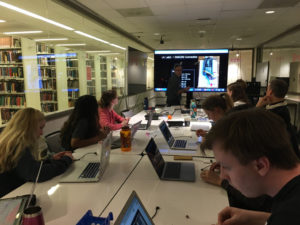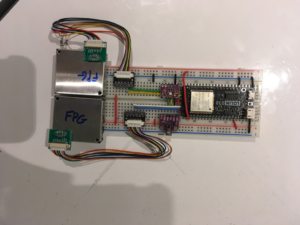The International Air Quality Lab
The International Air Quality Lab is now being offered as STIA 436 – Air Quality Innovation, a one-credit course with exciting implications.

STIA adjunct professor Pascal Girard and Father Christian Wagner are leading an initiative to implement kinesthetic learning. With STIA 436, a dedicated group of 10 students who meet in the Maker Hub every Tuesday evening from 5 to 6:15, theoretical concepts are being interwoven with practical applications of STIA.
Class involves both technical lectures and hands-on breadboarding. Students are currently coding in Terminal or Putty to send commands to their Raspberry Pi, turning on and off their hand-wired LED light circuits, as well as gathering data from their BME280, an affordable and intuitive humidity, temperature, and pressure sensor. This was many of the students’ first experience with anything resembling engineering, and triumphant smiles around the room were constant as their projects ended up working.
STIA adjunct professor Colin McCormick spearheaded the original class, STIA 315, in Spring of 2018. In this class, the solar-powered air quality monitors were used around the Georgetown community to test their effectiveness in giving people a general-level view of local air pollution.
“With very little engineering or computer science background, the students wired sensors, programmed a microcontroller, and conducted real-world experiments to measure air pollution in their community,” McCormick wrote in his blog on Medium.com.
The goal of the low-cost AQIs wired in STIA 436 is to send them out to communities which otherwise may not have access to local air quality monitors. This approach will allow low-income areas to track long-term pollution trends in order to take action to reduce their exposure and improve health.

Kelly Thomas, member of the Computer Science Student Advisory Team and a CS major in the College, works in the Maker Hub and has taken a personal interest in developing the engineering side of programming at Georgetown.
“There’s very little emphasis on the physical side of computing at Georgetown,” Thomas explained. “I think that the Maker Hub has so much to offer in terms of small-scale ‘engineering’ – what first comes to mind is using Arduinos/Raspberry Pis to power physical objects.”